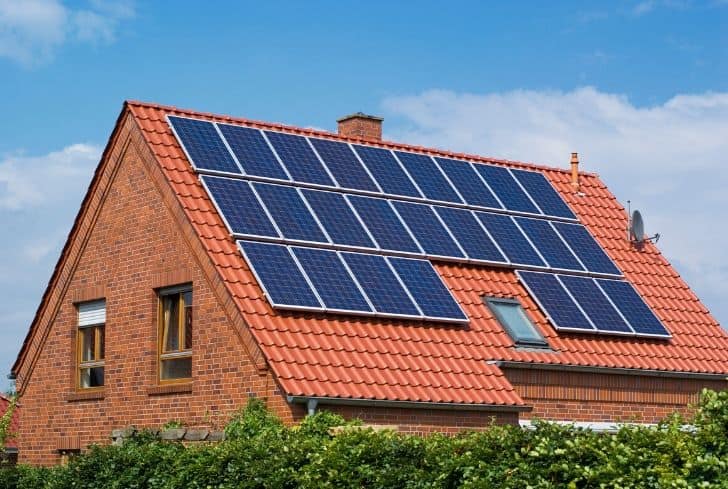Everyone’s looking for ways to go green and save a little green these days. A major source of expenditure for all of us is our electricity bill. It’s a great place to start saving money by making some small changes in your home. Whether you want to save planet earth or you’re interested in ways to lower your energy bills, here are 50 tips to help be proactive and money savvy when it comes to energy.
Read here more about 151 ways to conserve energy.
50 Super Easy Ways to Lower Your Electricity Bill
1. Install solar panels: This option may not be for everyone for its somewhat costly measures, but there’s nothing better than running on solar power for the environment and for your wallet. If you wish to cut your energy savings by more than 75%, this is the way to go.
2. Get a windmill: Well, this one might be tricky, but if you’re in a position to do this, planet earth will give you a big thumbs up. Naturally created energy is not only good for the environment but once set up costs are taken into consideration, it will cost you almost nothing.
3. Keep your temperature steady: Set your thermostat 2 degrees lower in the winter and 2 degrees higher in the summer. 72-74 degrees in the summer and 70-72 degrees in winter are suggested temperatures to set your thermostat to.
4. Check out energy-saving apps: Apps like kill-ur-watts will not only keep track of how much energy you use but give tips, advice, and resources to saving moolah each month on your energy bill.
5. Insulate your water heater: Adding a little extra love around your water heater can return huge savings. It’s estimated your fridge and water heater are the prime energy suckers in the home.
6. Tune-up your fridge: Having your fridge receive regular maintenance checks will keep the coils running clean, saving you hundreds of dollars a year.
7. Install a low-flow restrictor: Suppressing the amount of water used will help your hot water heater from sucking more energy out of your pocket.
8. Install dimmer switches: Adjusting the amount of light you need will not only set a certain mood but will allow you to use the most appropriate amount of energy.
9. Wash clothes on cold: When you add hot water to anything, you’re enlisting the help of your water heater.
10. Use effective cookware: Glass cookware cooks better than aluminum or others.
11. Thaw food: Having food thawed before cooking will not only save time but help reduce the amount of heat it takes to fully cook.
12. Regularly maintain your AC: Keeping your AC tuned and clean will ensure it runs as efficiently as possible.
13. Change your air filters regularly: Dirty air filters clog free-flowing air and make your AC work harder.
14. Close your chimney flue: If you have a wood-burning fireplace, make sure it’s closed in the summer.
15. Air-dry dishes: Instead of running the dishwasher, try air drying.
16. Insulate your garage door: Adding insulation to your garage door will keep heat and cool air in.
17. Check your weather strips: Energy savings could be seeping right out the front door with air leaks. Checking or replacing worn weather strips can help save on energy costs.
18. Clean your windows: Allowing as much natural sun to come through will heat up the house.
19. Cook on a fire pit: Barbequing is a great past time. However, try doing Dutch-oven cooking once in a while.
20. Reduce microwave use: If you can eat more salads, fruits, and vegetables, you’ll not only be healthier but will also use little energy to cook.
21. Use fans over air conditioner: If you can manage to delay turning on the AC, go for it. The same goes for the winter months. Use floor heaters and blankets.
22. Turn off the lights: When you leave a room, turn off the lights!
23. Open windows: In the summer, opening windows in the early morning will cool the house without cranking the air conditioning yet.
24. Turn off the fans: If you’re AC is running, there’s no need to have two energy sources going at the same time.
25. Reduce TV watching time: Especially those of us with young kids, TV watching is not only a waste of energy, but children need to be focused on a variety of activities anyway.
26. Hang dry clothes: If possible, hang dry towels, sheets, and other items that take a lot of energy to dry. A clothes dryer uses a lot of energy and produces heat. Use sunlight to dry your clothes.
27. Rearrange appliances: Having major appliances next to each other can double the amount of energy being emitted. If your washer and dryer are next to your water heater, if possible, consider moving them.
28. Buy energy star appliances: Keeping your 1980’s freezer in the garage from your mother is guzzling down money compared to top quality and energy-efficient appliances nowadays.
29. Install energy-efficient windows: Installing energy-efficient windows is another great way to save on your energy bill. There are also often tax rebates and other discounts available for going green.
30. Turn off the porch light: There’s nothing more comforting than driving through your neighborhood, seeing everyone’s porch lights illuminating the way home. Beautiful, yes, but a big waste of energy. Putting your outdoor lights on a timer will balance comfort vs. savings.
31. Change your bulbs: Switching to energy-efficient light bulbs are a great start to saving on your energy bill. Not only will that reduce the amount of watts used, but they last a lot longer too.
32. Unplug appliances when not in use: If you really don’t make toast that much, what’s the point in keeping it plugged in? The same goes for laptop plugs, phone chargers, etc.…Most of us leave these plugged in until we need them again, wasting energy. Whatever doesn’t require present power, try to unplug it.
33. Cook with lids on: This will enable your food to cook properly in sufficient time allotted and not waste more energy with unnecessary heat escaping.
34. Shut the door: It might sound obvious, but the amount of heat or air escaping when you chat with your neighbor through an open door, leave accessible for pets to meander in and out, or the constant traffic caused by kids sneaking snacks in between water fights, fluctuates your heating or cooling’s consistent flow.
35. Take advantage of off-peak rates: Most electric companies offer reduced off-peak rates that you can use to run your water heater, washing machine, dishwasher or air conditioner that consume a lot of energy.
36. Run dishwasher full loads: Always run your dishwasher full loads. Full loads use the same amount of energy and hot water as smaller loads.
37. Use sleep mode: Spend a few extra money to buy computer peripherals like scanner, printer that goes into sleep mode automatically or turn off when it isn’t being used.
38. Keep your vents open: Some people believe that closing a vent can reduce energy consumption by preventing a need to heat or cool a particular room. That’s actually a myth. Closing vents can actually raise your energy costs.
39. Ditch old fridge: Old refrigerators consume a lot of electricity. If you’re still using it, just get rid of it. You can end up saving money by replacing it with a new one. If you have multiple refrigerators, try scaling down to one.
40. Keep blinds or shades closed: The sun can really heat up the room when blinds or shades are kept open. Your air conditioner will use more energy to cool down your home.
41. Plant shady landscape: Shady landscape will protect your home from scorching heat which will reduce your air-conditioning costs in summers and block high winds that will reduce you heating costs during winters.
42. Seal up the house: In our homes, money leaks through cracks around the doors and windows. It’s simple enough to buy caulk and weather-stripping to seal cracks. According to Consumer Reports, sealing leaks can reduce energy costs by 15 to 30%
43. Use heat-generating appliances at night: It is obvious that a hot oven in the heat of the day forces the AC to work harder to keep the house at a comfortable temperature. The same applies to clothes dryers and dishwashers. Use these appliances at night when outside temperatures are cooler.
44. Don’t cool an empty house: If you have a programmable thermostat, program it as per your occupancy in the room. Close off rooms you aren’t occupying, as well.
45. Wear layers in winter: Space heating and cooling account for an average of 40 percent of household energy use. If you’re feeling cold, it’s always tempting to switch on the heater to stay warm and cozy. But bear in mind that this will hit your pocket. The cheapest way to warm up is to simply pop on an extra layer or two of clothes. Or use a blanket.
46. Use pedestal fans: Pedestal fans are unsung heroes in the cooling world, where air conditioners are people’s preferred option. Pedestal fans are adequate for cooling you down in most conditions – you only need to fall back onto air conditioning in more extreme conditions. They are much more economical to run compared to an air conditioner.
47. Cook and eat at the weather: While cooking a hot meal in the oven or microwave, do it smartly if you want to save on electricity. Don’t cook a hot roast on a scorching hot day. Firstly, it’ll heat up your house. Instead, drinking cold beverages and eating cool or room temperature food will help cool you down. Conversely, cooking hot food on a cold day is a great way to help warm up your body and house.
48. Cook in bulk and efficiently: Modern ovens chew up power around 2,400 watts on average. So if you’re going to switch it on, use it properly and cook in bulk. Avoid running your oven for a small meal. Cook enough food to get your lunches sorted for the whole week ahead.
And if you need to use the oven for both lunch and dinner, see if there’s a way to combine cooking both at the same time. Then when dinnertime comes, just reheat your meal in a microwave. Don’t forget home cooking is the way to go to save money, so think about how you can be more efficient.
49. Use air conditioning the smart way: Either avoid the air conditioner or use it smartly. If you are going to run your air conditioning unit, choose the right settings. Set it to 24-27°C (75-81°F) in summer or 18-20°C (64-68°F) in winter. Each degree under 24°C/75°F increases running costs by 10%. Save your money.
Even if you have a large home, don’t install ducted air conditioning. It’s far better off getting two or three strategically placed air conditioning units in your house and only running them as needed, rather than inefficiently cooling the entire house with ducted air conditioning. Use AC when it’s too cold or when it becomes unbearably hot.
50. Insulate your home: Well-insulated homes stay cooler for longer in summer and warmer for longer in winter. If possible, buy or build a house with sturdy walls that’ll absorb the outside temperature first. If you live in an area with extreme weather that either gets too hot or too cold), insulate the walls, roof/ceiling and even floors.
Installing insulation has an extra up-front cost. You can at least try insulation on the cheap – blinds, doors and windows. Whether it’s too hot or too cold, simply close all your external windows and doors, and then close all your blinds and even close off internal doors to act as extra insulation blockers.







